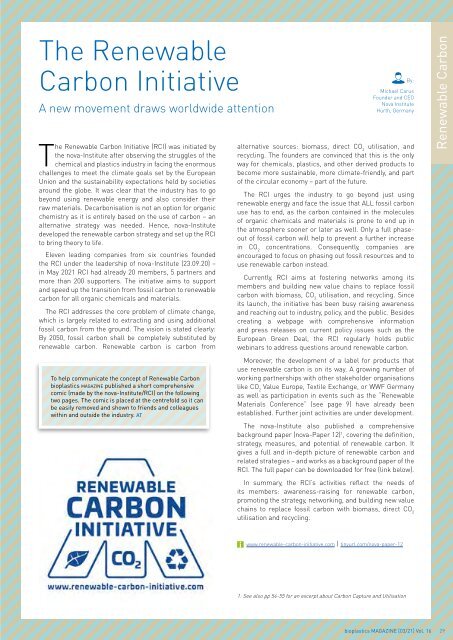issue 03/2021
Highlights: Bottles / Blow Moulding Joining Bioplastics Basics: Carbon Capture
Highlights:
Bottles / Blow Moulding
Joining Bioplastics
Basics: Carbon Capture
- No tags were found...
You also want an ePaper? Increase the reach of your titles
YUMPU automatically turns print PDFs into web optimized ePapers that Google loves.
The Renewable<br />
Carbon Initiative<br />
A new movement draws worldwide attention<br />
The Renewable Carbon Initiative (RCI) was initiated by<br />
the nova-Institute after observing the struggles of the<br />
chemical and plastics industry in facing the enormous<br />
challenges to meet the climate goals set by the European<br />
Union and the sustainability expectations held by societies<br />
around the globe. It was clear that the industry has to go<br />
beyond using renewable energy and also consider their<br />
raw materials. Decarbonisation is not an option for organic<br />
chemistry as it is entirely based on the use of carbon – an<br />
alternative strategy was needed. Hence, nova-Institute<br />
developed the renewable carbon strategy and set up the RCI<br />
to bring theory to life.<br />
Eleven leading companies from six countries founded<br />
the RCI under the leadership of nova-Institute (23.09.20) –<br />
in May <strong>2021</strong> RCI had already 20 members, 5 partners and<br />
more than 200 supporters. The initiative aims to support<br />
and speed up the transition from fossil carbon to renewable<br />
carbon for all organic chemicals and materials.<br />
The RCI addresses the core problem of climate change,<br />
which is largely related to extracting and using additional<br />
fossil carbon from the ground. The vision is stated clearly:<br />
By 2050, fossil carbon shall be completely substituted by<br />
renewable carbon. Renewable carbon is carbon from<br />
To help communicate the concept of Renewable Carbon<br />
bioplastics MAGAZINE published a short comprehensive<br />
comic (made by the nova-Institute/RCI) on the following<br />
two pages. The comic is placed at the centrefold so it can<br />
be easily removed and shown to friends and colleagues<br />
within and outside the industry. AT<br />
alternative sources: biomass, direct CO 2<br />
utilisation, and<br />
recycling. The founders are convinced that this is the only<br />
way for chemicals, plastics, and other derived products to<br />
become more sustainable, more climate-friendly, and part<br />
of the circular economy – part of the future.<br />
The RCI urges the industry to go beyond just using<br />
renewable energy and face the <strong>issue</strong> that ALL fossil carbon<br />
use has to end, as the carbon contained in the molecules<br />
of organic chemicals and materials is prone to end up in<br />
the atmosphere sooner or later as well. Only a full phaseout<br />
of fossil carbon will help to prevent a further increase<br />
in CO 2<br />
concentrations. Consequently, companies are<br />
encouraged to focus on phasing out fossil resources and to<br />
use renewable carbon instead.<br />
Currently, RCI aims at fostering networks among its<br />
members and building new value chains to replace fossil<br />
carbon with biomass, CO 2<br />
utilisation, and recycling. Since<br />
its launch, the initiative has been busy raising awareness<br />
and reaching out to industry, policy, and the public. Besides<br />
creating a webpage with comprehensive information<br />
and press releases on current policy <strong>issue</strong>s such as the<br />
European Green Deal, the RCI regularly holds public<br />
webinars to address questions around renewable carbon.<br />
Moreover, the development of a label for products that<br />
use renewable carbon is on its way. A growing number of<br />
working partnerships with other stakeholder organisations<br />
like CO 2<br />
Value Europe, Textile Exchange, or WWF Germany<br />
as well as participation in events such as the “Renewable<br />
Materials Conference” (see page 9) have already been<br />
established. Further joint activities are under development.<br />
The nova-Institute also published a comprehensive<br />
background paper (nova-Paper 12) 1 , covering the definition,<br />
strategy, measures, and potential of renewable carbon. It<br />
gives a full and in-depth picture of renewable carbon and<br />
related strategies – and works as a background paper of the<br />
RCI. The full paper can be downloaded for free (link below).<br />
In summary, the RCI’s activities reflect the needs of<br />
its members: awareness-raising for renewable carbon,<br />
promoting the strategy, networking, and building new value<br />
chains to replace fossil carbon with biomass, direct CO 2<br />
utilisation and recycling.<br />
By:<br />
Michael Carus<br />
Founder and CEO<br />
Nova Institute<br />
Hürth, Germany<br />
Renewable Carbon<br />
www.renewable-carbon-initiative.com | tinyurl.com/nova-paper-12<br />
1: See also pp 54-55 for an excerpt about Carbon Capture and Utilisation<br />
bioplastics MAGAZINE [<strong>03</strong>/21] Vol. 16 29


















